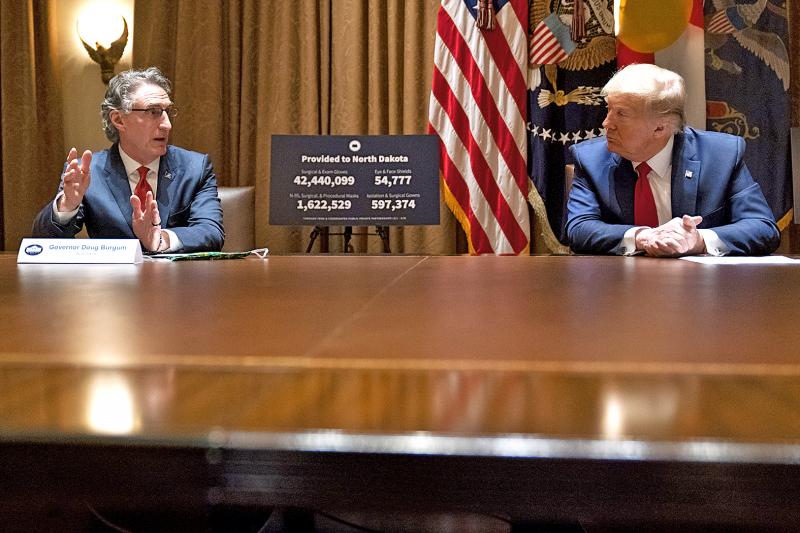US President Donald Trump on Wednesday extended for another year an executive order signed in May last year declaring a national emergency and barring US companies from using telecommunications equipment made by firms posing a national security risk.
The order invoked the US International Emergency Economic Powers Act, which gives the president the authority to regulate commerce in response to a national emergency.
US lawmakers said that Trump’s order last year was aimed squarely at Chinese companies such as Huawei Technologies Co (華為) and ZTE Corp (中興).

Photo: AP
The US Department of Commerce is expected to extend again a license, set to expire today, allowing US companies to keep doing business with Huawei, a person briefed on the matter said.
The department has issued a series of extensions of the temporary license and previously extended it until April 1.
Huawei, the second-largest maker of smartphones, is also a major telecoms equipment company that provides 5G network technology.
In March, the department sought public comments on whether it should issue future extensions and asked what was the “impact on your company or organization if the temporary general license is not extended?”
It also asked about the costs associated with ending the licenses.
Wireless trade association CTIA urged the department to approve a “long-term” license extension, writing that “now is not the time to hamper global operators’ ability to maintain the health of the networks.”
The association said that “ongoing, limited engagement with Huawei to protect the security of equipment and devices in the market benefits American consumers by reducing the risk that they will be subject to device compromise.”
It also asked the department to “reinstate and modify its prior authorization for standards development work to allow for exchanges with Huawei in furtherance of global telecommunications standards.”
The commerce department and Huawei declined to comment.
Since adding Huawei to an economic blacklist in May last year, citing national security concerns, the department has allowed it to purchase some US-made goods in a move aimed at minimizing disruption for its customers, many of which operate wireless networks in rural areas of the US.
In November last year, the US Federal Communications Commission designated Huawei and ZTE as national security risks, effectively barring their rural customers in the US from tapping an US$8.5 billion government fund to purchase equipment.

UNCERTAINTY: Innolux activated a stringent supply chain management mechanism, as it did during the COVID-19 pandemic, to ensure optimal inventory levels for customers Flat-panel display makers AUO Corp (友達) and Innolux Corp (群創) yesterday said that about 12 to 20 percent of their display business is at risk of potential US tariffs and that they would relocate production or shipment destinations to mitigate the levies’ effects. US tariffs would have a direct impact of US$200 million on AUO’s revenue, company chairman Paul Peng (彭雙浪) told reporters on the sidelines of the Touch Taiwan trade show in Taipei yesterday. That would make up about 12 percent of the company’s overall revenue. To cope with the tariff uncertainty, AUO plans to allocate its production to manufacturing facilities in

TAKING STOCK: A Taiwanese cookware firm in Vietnam urged customers to assess inventory or place orders early so shipments can reach the US while tariffs are paused Taiwanese businesses in Vietnam are exploring alternatives after the White House imposed a 46 percent import duty on Vietnamese goods, following US President Donald Trump’s announcement of “reciprocal” tariffs on the US’ trading partners. Lo Shih-liang (羅世良), chairman of Brico Industry Co (裕茂工業), a Taiwanese company that manufactures cast iron cookware and stove components in Vietnam, said that more than 40 percent of his business was tied to the US market, describing the constant US policy shifts as an emotional roller coaster. “I work during the day and stay up all night watching the news. I’ve been following US news until 3am

Taiwan will prioritize the development of silicon photonics by taking advantage of its strength in the semiconductor industry to build another shield to protect the local economy, National Development Council (NDC) Minister Paul Liu (劉鏡清) said yesterday. Speaking at a meeting of the legislature’s Economics Committee, Liu said Taiwan already has the artificial intelligence (AI) industry as a shield, after the semiconductor industry, to safeguard the country, and is looking at new unique fields to build more economic shields. While Taiwan will further strengthen its existing shields, over the longer term, the country is determined to focus on such potential segments as

COLLABORATION: Given Taiwan’s key position in global supply chains, the US firm is discussing strategies with local partners and clients to deal with global uncertainties Advanced Micro Devices Inc (AMD) yesterday said it is meeting with local ecosystem partners, including Taiwan Semiconductor Manufacturing Co (TSMC, 台積電), to discuss strategies, including long-term manufacturing, to navigate uncertainties such as US tariffs, as Taiwan occupies an important position in global supply chains. AMD chief executive officer Lisa Su (蘇姿丰) told reporters that Taiwan is an important part of the chip designer’s ecosystem and she is discussing with partners and customers in Taiwan to forge strong collaborations on different areas during this critical period. AMD has just become the first artificial-intelligence (AI) server chip customer of TSMC to utilize its advanced